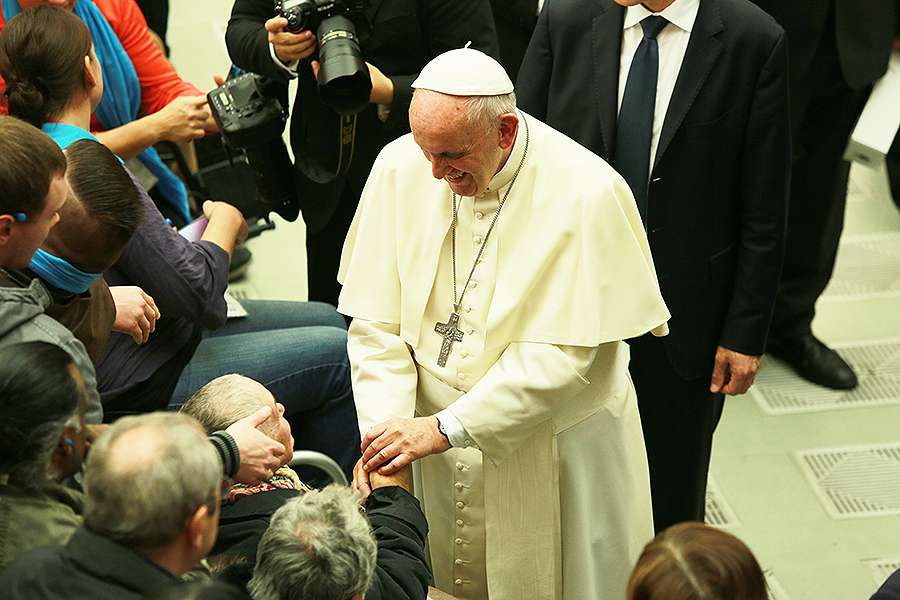On Friday, Pope Francis said that the work of evangelization belongs to all people, and that the richness found in a variety of traditions can be a way of opening people’s hearts to the Gospel. “The new stage of evangelization we are called upon to follow is certainly the work of the whole Church, ‘people on the way to God,’” he said Sept. 29. Evangelization “by its very nature belongs to the People of God.”
Referencing the Second Vatican Council document Lumen gentium, he said, “From every population to which we go, a wealth emerges which the Church is called to recognize and value to bring about the unity of 'all mankind' of which it is the 'sign' and ‘the sacrament.’”
Pope Francis’ speech was part of a meeting with around 60 members of the Pontifical Council for the Promotion of the New Evangelization, at the conclusion of their plenary session Sept. 27-29. In the audience, he told them he wanted to reflect on the “urgency” the Church feels to “renew its efforts and enthusiasm” for its mission of evangelization.
The many good traditions that people and their cultures possess give richness to the Church and life to the action of grace, which opens hearts to accept the Gospel, he said. These traditions are “authentic gifts” expressing the infinite creativity of the Father and fostering communion, which then acts as a “seed of salvation, a prelude to universal peace and a concrete place of dialogue.”
Pope Francis also emphasized that the call to evangelize “transcends” the availability of a single person, but is actually part of a complex design of interpersonal relationships. “Few institutions like the Church can boast of having a knowledge of the people able to enhance that cultural, moral and religious heritage that is the identity of entire generations,” he said.
This is why, he explained, it is important that in our evangelization efforts we know how to enter people’s hearts and help them to discover the sense of God and his love that gives confidence and serenity despite difficulty and challenge. If we look deeply, he continued, we may find a “genuine desire for God that makes restless the heart of so many fallen people…” “The joy of evangelization can reach them and give them the strength for conversion,” he said.
Pope Francis also reflected on last year’s Jubilee Year of Mercy, which he said was a time of grace lived by the whole Church “with great faith and intense spirituality,” especially the rediscovery of the Sacrament of Reconciliation. “We cannot permit that such enthusiasm be diluted or forgotten,” he said.
The Pope said that everyone who evangelizes should be committed to announcing the message of mercy, which is made concrete and visible in the lives of believers.
Furthermore, those who have the task of proclaiming the Gospel should remember the words of the Apostle Paul, who says in 1 Timothy 1:12-16: “I am grateful to him who has strengthened me, Christ Jesus our Lord, because he considered me trustworthy in appointing me to the ministry.” “I was once a blasphemer and a persecutor and an arrogant man, but I have been mercifully treated because I acted out of ignorance in my unbelief. Indeed, the grace of our Lord has been abundant, along with the faith and love that are in Christ Jesus,” the Pope quoted.
“This saying is trustworthy and deserves full acceptance: Christ Jesus came into the world to save sinners. Of these I am the foremost.” The Church has a great responsibility to continue to be an instrument of mercy, Francis said. “In this way, it can be easier to allow the reception of the Gospel to be perceived and lived as an event of salvation and it can bring a full and definitive meaning to personal and social life.”

